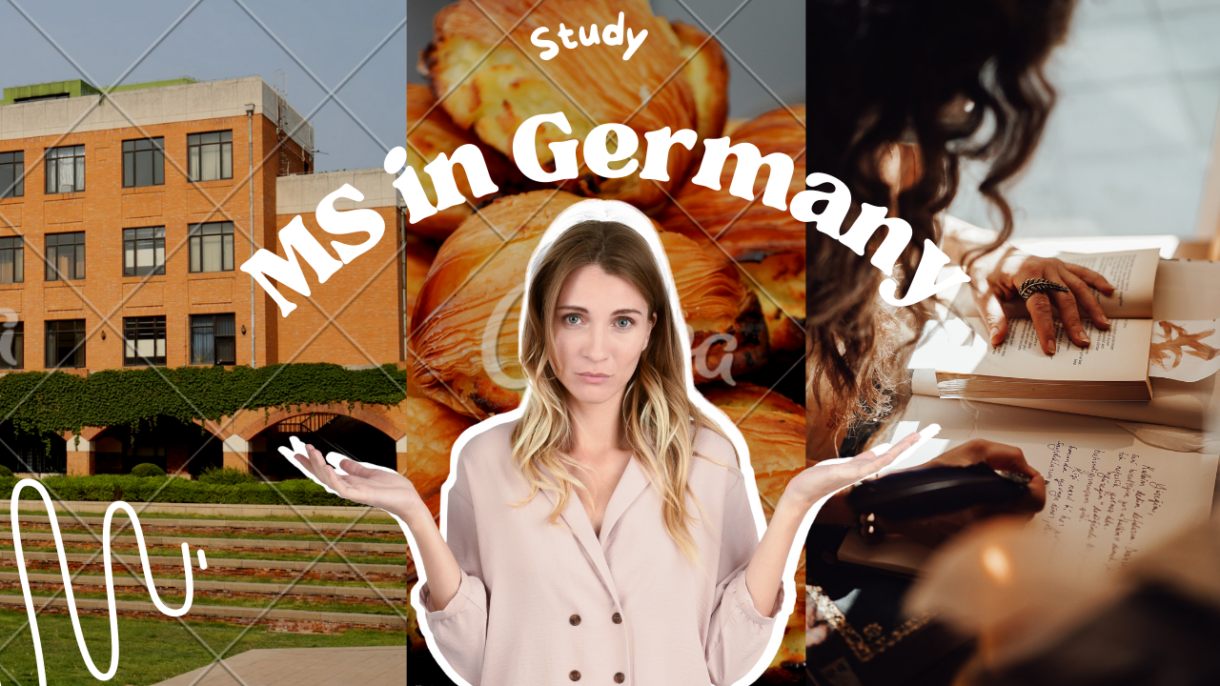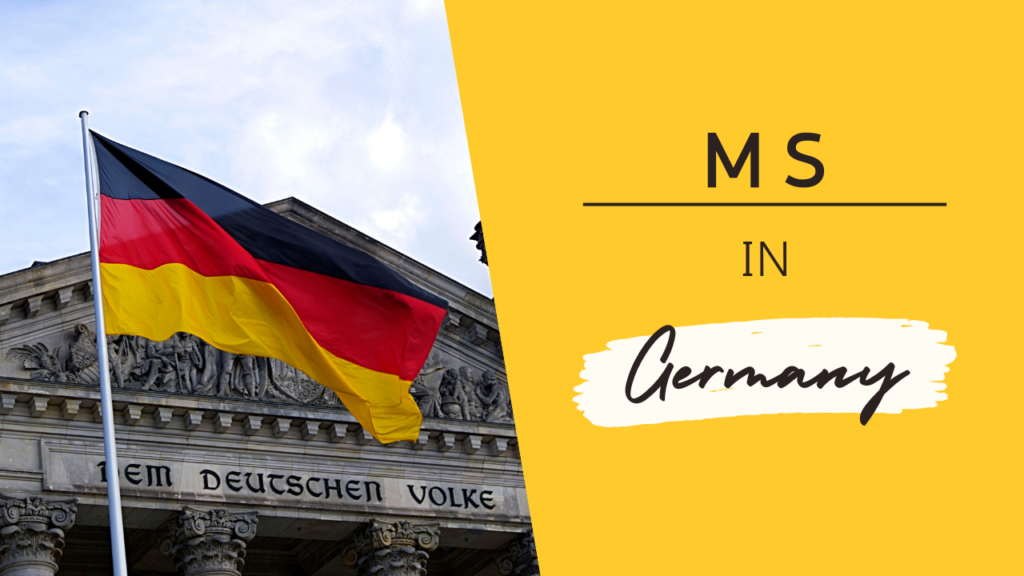
What is an MS in Germany?
A Master of Science (MS) in Germany is a postgraduate degree offered by German universities in various fields, including engineering, business analytics, and data science. These programs are known for their high academic standards, research-driven curriculum, and strong industry connections.
Why Study MS in Germany?
Germany is a top choice for students seeking a Master of Science (MS) degree. With world-class institutions offering tuition-free learning and strong industry connections, Germany provides a powerful combination of high-quality education and professional prospects.
Benefits of Pursuing MS in Germany
1. Top-Ranked Universities
Germany is home to prestigious universities such as:
- Technical University of Munich (TUM)
- RWTH Aachen University
- University of Stuttgart
- Karlsruhe Institute of Technology (KIT)
2. Low or No Tuition Fees
Public universities in Germany have minimal or no tuition costs, making them an economical option compared to countries like the USA and the UK.
3. Globally Recognized Degrees
A German Master’s degree is widely recognized by employers worldwide, offering excellent career advancement opportunities.
4. Strong Research & Innovation Hub
Germany is a global leader in engineering, IT, and biotechnology, providing access to cutting-edge research and industrial collaborations.
Eligibility Criteria for MS in Germany
1. Academic Requirements
- Bachelor’s degree in a relevant field with an average GPA of 3.0/4.0
- Strong academic background in engineering, mathematics, or sciences (depending on the subject)
2. Language Proficiency
- English-taught programs: IELTS (6.5 or above) or TOEFL (90+)
- German-taught courses: TestDaF or DSH test
3. Work Experience (Optional)
Some universities prefer applicants with industry experience, particularly for technical or management courses.
Top MS Courses in Germany
Germany offers MS programs in various disciplines. Some of the most sought-after include:
- MS in Mechanical Engineering
- MS in Computer Science
- MS in Data Science & AI
- MS in Automotive Engineering
- MS in Biotechnology
- MS in Renewable Energy
How to Apply for MS in Germany
Step 1: Shortlist Universities & Courses
Research universities based on rankings, curriculum, faculty, and research facilities.
Step 2: Prepare Documents
Typical requirements include:
- Academic transcripts
- Statement of Purpose (SOP)
- Letters of Recommendation (LORs)
- CV/Resume
- Language proficiency test scores
- GRE (if required by the university)
Step 3: Submit Applications
Apply through the university portals or via Uni-Assist for multiple universities.
Step 4: Apply for Scholarships
Scholarships like DAAD, Heinrich Boll Foundation, and Erasmus+ can ease financial burdens.
Step 5: Apply for a Student Visa
- Secure an admission letter
- Provide proof of financial resources (blocked account with EUR 11,208 per year)
- Apply at the German consulate
Cost of Studying MS in Germany
- Tuition Fees: EUR 0 – EUR 5,000 per year (public universities)
- Living Costs: EUR 850 – EUR 1,200 per month (includes rent, food, transport, and insurance)
- Health Insurance: ~EUR 110 per month
Post-Study Work & Job Opportunities
Stay Back Period
Germany allows an 18-month job search visa post-graduation.
Popular Industries Hiring MS Graduates
- Automobile & Mechanical Engineering (BMW, Volkswagen, Siemens)
- IT & Software Development (SAP, Deutsche Telekom)
- Biotechnology & Pharmaceuticals (Bayer, Merck)

6 Common Challenges Students Face & Solutions
1. Tough Admission Process
Challenge: High competition, German language requirement, and academic rigor.
Solution: Strong SOP, good CGPA, and early application submission.
2. Financial Documentation & Living Costs
Challenge: Blocked account requirement (EUR 11,208 per year).
Solution: Open a blocked account early with providers like Fintiba or Expatrio.
3. Language Barriers & Cultural Differences
Challenge: Daily life in Germany requires basic German skills.
Solution: Learn German (A1/A2) before arrival and practice with locals.
4. Visa Rules & Work Limitations
Challenge: Part-time work limited to 120 full or 240 half days per year.
Solution: Budget wisely and look for student-friendly jobs.
5. University Workload & Research Pressure
Challenge: German education is research-intensive.
Solution: Improve time management and seek guidance from professors.
6. Competitive Job Market & Work Visa
Challenge: Need for post-study work permits.
Solution: Start networking early, apply for internships, and use job portals.
13 Crucial Tips for MS in Germany
1. Choose the Right University & Course
Research TU9 universities, public institutions, and applied sciences institutes.
2. Understand Admission Requirements
Most programs require a 4-year bachelor’s degree, IELTS/TOEFL, strong SOP, LORs, and some may require GRE scores.
3. Learn About Tuition Fees & Living Costs
Public universities have low or no tuition fees, but living costs range from EUR 800 – EUR 1,200/month. Cities like Munich and Berlin are more expensive.
4. Apply for Scholarships
Check DAAD, Deutschlandstipendium, and university-specific funding options.
5. Learn Basic German
Even for English-taught courses, knowing German (A2/B1) helps in daily life and job opportunities.
6. Meet Visa & Blocked Account Requirements
A blocked account of EUR 11,208 is mandatory. Apply for a visa at least 3 months before your program starts.
7. Get Health Insurance
Choose public (TK, AOK) or private insurance based on your health needs.
8. Apply Early Through Uni-Assist
Winter intake (Oct): Apply May – July
Summer intake (April): Apply Nov – Jan
9. Prepare a Strong SOP & LORs
Highlight your academic and professional strengths in SOP and LORs.
10. Research Student Job Opportunities
International students can work 120 full or 240 half days per year. Look for HiWi (research assistant) or internships.
11. Plan Your Accommodation Early
Student dorms are cheaper but fill up fast. Private apartments cost EUR 400 – 800/month. Use WG-Gesucht and Studentenwerk.
12. Understand Post-Study Work Visa Rules
After graduation, you have 18 months to find a job. Many students transition to a Blue Card or PR (Permanent Residence).
13. Join Alumni Networks & Connect with Professionals
Use LinkedIn, alumni networks, and student clubs for career growth.

Expert Opinions on MS in Germany
Dr. Stefan Reichel, Education Consultant & German University Advisor
“Germany is a world-class education destination with a strong focus on research and development. With free tuition at many public universities and access to cutting-edge technology, an MS in Germany is an excellent choice for international students.”
Prof. Klaus Muller, Academic Director at a German University
“Pursuing a master’s degree in Germany not only provides top-quality education but also opens doors to global career opportunities. With strong industry ties, internship programs, and post-graduation work opportunities, Germany is ideal for STEM and management graduates.”
How LetzStudy Helped Students Achieve Their MS in Germany Dream
1. Priya’s Journey: Overcoming IELTS Challenges
Challenge: Priya, an engineering graduate from Bangalore, struggled with the IELTS exam, a key requirement for university admission.
How LetzStudy Helped:
- Provided personalized IELTS training.
- Recommended top German universities based on her profile.
- Guided her through the visa application and blocked account setup.
Result: Priya is now pursuing her MS in Data Science at the Technical University of Munich (TUM).
2. Raj’s Success: Navigating Finances & Scholarships
Challenge: Raj, a mechanical engineering graduate, was worried about the financial burden of studying in Germany.
How LetzStudy Helped:
- Assisted him in securing a DAAD scholarship.
- Helped draft a strong Statement of Purpose (SOP) and Letters of Recommendation (LOR).
- Advised him on opening a blocked account for financial security.
Result: Raj is now studying MS in Automotive Engineering at RWTH Aachen University.
3. Neha’s Success: Finding the Right University
Challenge: Neha, a software developer, was unsure about selecting the best university for her MS in Artificial Intelligence.
How LetzStudy Helped:
- Provided a customized university shortlist based on her career goals.
- Assisted with application document preparation and submission.
- Conducted mock visa interviews to boost her confidence.
Result: Neha is now studying at the University of Stuttgart, pursuing her dream career in AI.
Want to Study MS in Germany? LetzStudy Can Help!
Are you ready to start your MS journey in Germany? LetzStudy offers expert guidance on university selection, applications, scholarships, and visa processes.
Book a Free Consultation Today!
Contact Us Now: +91 9380486921
For more information, connect with us on LinkedIn, and for daily updates, follow us on Instagram
*Universities regularly update their fees, eligibility, and policies. While we aim to keep this content accurate, readers should always check official sources for the latest information.

